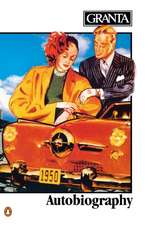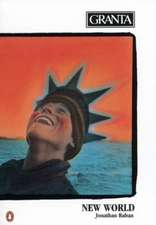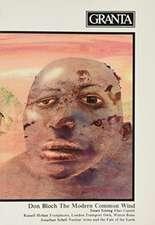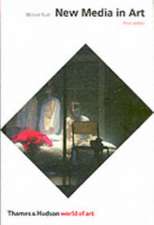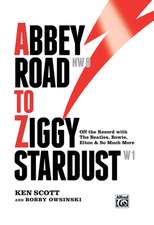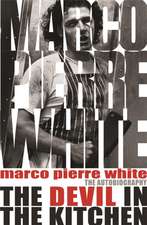Heat: An Amateur's Adventures as Kitchen Slave, Line Cook, Pasta-Maker, and Apprentice to a Dante-Quoting Butcher in Tuscany
Autor Bill Buforden Limba Engleză Paperback – 31 mai 2007
Vezi toate premiile Carte premiată
Quill Awards (2006), James Beard Foundation Book Awards (2007)
Preț: 99.60 lei
Nou
Puncte Express: 149
Preț estimativ în valută:
19.06€ • 19.80$ • 15.83£
19.06€ • 19.80$ • 15.83£
Carte indisponibilă temporar
Doresc să fiu notificat când acest titlu va fi disponibil:
Se trimite...
Preluare comenzi: 021 569.72.76
Specificații
ISBN-13: 9781400034475
ISBN-10: 1400034477
Pagini: 318
Dimensiuni: 139 x 202 x 19 mm
Greutate: 0.25 kg
Editura: Vintage Books USA
ISBN-10: 1400034477
Pagini: 318
Dimensiuni: 139 x 202 x 19 mm
Greutate: 0.25 kg
Editura: Vintage Books USA
Notă biografică
Bill Buford is a Staff Writer and European Correspondent for The New Yorker. He was the Fiction Editor of the magazine for eight years, from April 1995 to December 2002. Before that he edited Granta magazine for sixteen years and, in 1989, became the publisher of Granta Books. He has edited three anthologies: The Best of Granta Travel, The Best of Granta Reportage, and The Granta Book of the Family. Bill is also the author of Among the Thugs (Norton, 1992), a highly personal nonfiction account of crowd violence and British soccer hooliganism. For The New Yorker, he has written about sweatshops, the singer-songwriter Lucinda Williams, and chef Mario Batali. Born in Baton Rouge, Louisiana, in 1954, Bill Buford grew up in California and was educated at the University of California at Berkeley and at Kings College, Cambridge, where he was awarded a Marshall Scholarship for his work on Shakespeare's plays and sonnets. He lives in New York City with his wife, Jessica Green, and their two sons.
Extras
<a name="iti1"></a>Linguine with Clams
If you're tempted to make linguine with clams according to the kitchen's preparation, you should understand that the only ingredient that's measured is the pasta. (A serving is four ounces.) Everything else is what you pick up with your fingertips, and it's either a small pinch or a large pinch or something in between: not helpful, but that, alas, is the way quantities are determined in a restaurant.
The downside of measuring by hand is what happens to the hands. At the end of an evening your fingertips are irretrievably stained with some very heady aromatics, and there's nothing you can do to eliminate them. You wash your hands. You soak them. You shower, you scrub them again. The next day, they still stink of onion, garlic, and pork fat, and, convinced that everyone around you is picking up the smell, you ram them into your pockets, maniacally rubbing your fingers against each other like an obsessive-compulsive Lady Macbeth.
Ingredients
small pinch of chopped garlic
small pinch of chili flakes
medium pinch of chopped onion
medium pinch of pancetta
olive oil
butter
white wine
4 oz. linguine per serving
A big handful of clams
parsley
NOTE: the ingredients and preparations in this recipe are approximate—experiment with proportions to make it to your taste.
Begin by roasting small pinches of garlic and chili flakes and medium pinches of the onion and pancetta in a hot pan with olive oil. Hot oil accelerates the cooking process,and the moment everything gets soft you pour it away (holding back the contents with your tongs) and add a slap of butter and a splash of white wine, which stops the cooking. This is Stage One—and you are left with the familiar messy buttery mush—but already you've added two things you'd never see in Italy: butter (seafood with butter—or any other dairy ingredient—verges on culinary blasphemy) and pancetta, because, according to Mario, pork and shellfish are an eternal combination found in many other places: in Portugal, in amêijoas na cataplana (clams and ham); or in Spain, in a paella (chorizo and scallops); or in the United States, in the Italian-American clams casino, even though none of those places happens to be in Italy.
In Stage Two, you drop the pasta in boiling water and take your messy buttery pan and fill it with a big handful of clams and put it on the highest possible flame. The objective is to cook them fast—they'll start opening after three or four minutes, when you give the pan a swirl, mixing the shellfish juice with the buttery porky white wine emulsion. At six minutes and thirty seconds, you use your tongs to pull your noodles out and drop them into your pan—all that starchy pasta water slopping in with them is still a good thing; give the pan another swirl; flip it; swirl it again to ensure that the pasta is covered by the sauce. If it looks dry, add another splash of pasta water; if too wet, pour some out. You then let the thing cook away for another half minute or so, swirling, swirling, until the sauce streaks across the bottom of the pan, splash it with olive oil and sprinkle it with parsley: dinner.
The first glimpse I had of what Mario Batali’s friends had described to me as the “myth of Mario” was on a cold Saturday night in January 2002, when I invited him to a birthday dinner. Batali, the chef and co-owner of Babbo, an Italian restaurant in Manhattan, is such a famous and proficient cook that he’s rarely invited to people’s homes for a meal, he told me, and he went out of his way to be a grateful guest. He arrived bearing his own quince-flavored grappa (the rough, distilled end-of-harvest grape juices rendered almost drinkable by the addition of the fruit); a jar of homemade nocino (same principle, but with walnuts); an armful of wine; and a white, dense slab of lardo—literally, the raw “lardy” back of a very fat pig, one he’d cured himself with herbs and salt. I was what might generously be described as an enthusiastic cook, more confident than competent (that is, keen but fundamentally clueless), and to this day I am astonished that I had the nerve to ask over someone of Batali’s reputation, along with six guests who thought they’d have an amusing evening witnessing my humiliation. (Mario was a friend of the birthday friend, so I’d thought—why not invite him, too?—but when, wonder of wonders, he then accepted and I told my wife, Jessica, she was apoplectic with wonder: “What in the world were you thinking of, inviting a famous chef to our apartment for dinner? Now what are we going to do?”)
In the event, there was little comedy, mainly because Mario didn’t give me a chance. Shortly after my being instructed that only a moron would let his meat rest by wrapping it in foil after cooking it, I cheerfully gave up and let Batali tell me what to do. By then he’d taken over the evening, anyway. Not long into it, he’d cut the lardo into thin slices and, with a startling flourish of intimacy, laid them individually on our tongues, whispering that we needed to let the fat melt in our mouths to appreciate its intensity. The lardo was from a pig that, in the last months of its seven-hundred-and-fifty-pound life, had lived on apples, walnuts, and cream (“The best song sung in the key of pig”), and Mario convinced us that, as the fat dissolved, we’d detect the flavors of the animal’s happy diet—there, in the back of the mouth. No one that evening had knowingly eaten pure fat before (“At the restaurant, I tell the waiters to call it prosciutto bianco”), and by the time Mario had persuaded us to a third helping everyone’s heart was racing. Batali was an impressively dedicated drinker—he mentioned in passing that, on trips to Italy made with his Babbo co-owner, Joe Bastianich, the two of them had been known to put away a case of wine during an evening meal—and while I don’t think that any of us drank anything like that, we were, by now, very thirsty (the lardo, the salt, the human heat of so much jollity) and, cheered on, found ourselves knocking back more and more. I don’t know. I don’t really remember. There were also the grappa and the nocino, and one of my last images is of Batali at three in the morning—a stoutly round man with his back dangerously arched, his eyes closed, a long red ponytail swinging rhythmically behind him, an unlit cigarette dangling from his mouth, his red Converse high-tops pounding the floor—playing air guitar to Neil Young’s “Southern Man.” Batali was forty-one, and I remember thinking it had been a long time since I’d seen a grown man play air guitar. He then found the soundtrack for Buena Vista Social Club, tried to salsa with one of the women guests (who promptly fell over a sofa), moved on to her boyfriend, who was unresponsive, put on a Tom Waits CD instead, and sang along as he washed the dishes and swept the floor. He reminded me of an arrangement we’d made for the next day—when I’d invited Batali to dinner, he’d reciprocated by asking me to join him at a New York Giants football game, tickets courtesy of the commissioner of the NFL, who had just eaten at Babbo—and then disappeared with three of my friends, assuring them that, with his back-of-the-hand knowledge of downtown establishments open until five, he’d find a place to continue the evening. They ended up at Marylou’s in the Village—in Batali’s description, “A wise guy joint where you can get anything at any time of night, and none of it good.”
It was daylight when Batali got home. I learned this from his building superintendent the next morning, as the two of us tried to get Batali to wake up—the commissioner’s driver was waiting outside. When Batali finally appeared, forty-five minutes later, he was momentarily perplexed, standing in the doorway of his apartment in his underwear and wondering why I was there, too. (Batali has a remarkable girth, and it was startling to see him clad so.) Then, in minutes, he transformed himself into what I would come to know as the Batali look: the shorts, the clogs, the wraparound sunglasses, the red hair pulled back into its ponytail. One moment, a rotund Clark Kent in his underpants; the next, “Molto Mario”—the clever, many-layered name of his cooking television program, which, in one of its senses, literally means Very Mario (that is, an intensified Mario, an exaggerated Mario)—and a figure whose renown I didn’t appreciate until, as guests of the commissioner, we were allowed onto the field before the game. Fans of the New York Giants are so famously brutish as to be cartoons (bare-chested on a wintry morning or wearing hard hats; in any case, not guys putting in their domestic duty in the kitchen), and I was surprised by how many recognized the ponytailed chef, who stood facing them, arms crossed over his chest, beaming. “Hey, Molto!” they shouted. “What’s cooking, Mario?” “Mario, make me a pasta!” At the time, Molto Mario was shown on afternoons on cable television, and I found a complex picture of the working metropolitan male emerging, one rushing home the moment his shift ended to catch lessons in braising his broccoli rabe and getting just the right forked texture on his homemade orecchiette. I stood back with one of the security people, taking in the spectacle (by now members of the crowd were chanting “Molto, Molto, Molto”)—this very round man, whose manner and dress said, “Dude, where’s the party?”
“I love this guy,” the security man said. “Just lookin’ at him makes me hungry.”
Mario Batali is the most recognized chef in a city with more chefs than any other city in the world. In addition to Batali’s television show—and his appearances promoting, say, the NASCAR race track in Delaware—he was simply and energetically omnipresent. It would be safe to say that no New York chef ate more, drank more, and was out and about as much. If you live in New York City, you will see him eventually (sooner, if your evenings get going around two in the morning). With his partner, Joe, Batali also owned two other restaurants, Esca and Lupa, and a shop selling Italian wine, and, when we met, they were talking about opening a pizzeria and buying a vineyard in Tuscany. But Babbo was the heart of their enterprise, crushed into what was originally a nineteenth-century coach house, just off Washington Square, in Greenwich Village. The building was narrow; the space was crowded, jostly, and loud; and the food, studiously Italian, rather than Italian-American, was characterized by an over-the-top flourish that seemed to be expressly Batali’s. People went there in the expectation of excess. Sometimes I wondered if Batali was less a conventional cook than an advocate of a murkier enterprise of stimulating outrageous appetites (whatever they might be) and satisfying them intensely (by whatever means). A friend of mine, who’d once dropped by the bar for a drink and was then fed personally by Batali for the next six hours, went on a diet of soft fruit and water for three days. “This guy knows no middle ground. It’s just excess on a level I’ve never known before—it’s food and drink, food and drink, food and drink, until you feel you’re on drugs.” Chefs who were regular visitors were subjected to extreme versions of what was already an extreme experience. “We’re going to kill him,” Batali said to me with maniacal glee as he prepared a meal for a rival who had innocently ordered a seven-course tasting menu, to which Batali added a lethal number of extra courses. The starters (all variations in pig) included lonza (the cured backstrap from the cream-apple-and-walnut herd), coppa (from the shoulder), a fried foot, a porcini mushroom roasted with Batali’s own pancetta (the belly), plus (“for the hell of it”) a pasta topped with guanciale (the jowls). This year, Mario was trying out a new motto: “Wretched excess is just barely enough.”
Batali was born in 1960 and grew up outside Seattle: a suburban kid with a solid Leave It to Beaver upbringing. His mother, Marilyn, is En-glish and French Canadian—from her comes her son’s flaming red hair and a fair, un-Italian complexion. The Italian is from his father, Armandino, the grandson of immigrants who arrived in the 1890s. When Mario was growing up, his father was a well-paid Boeing executive in charge of procuring airplane parts made overseas, and in 1975, after being posted to Europe, to supervise the manufacturing close-up, he moved his family to Spain. That, according to Gina, Mario’s youngest sibling, was when Mario changed. (“He was already pushing the limits.”) Madrid, in the post-Franco years (bars with no minimum age, hash hangouts, the world’s oldest profession suddenly legalized), was a place of exhilarating license, and Mario seems to have experienced a little bit of everything on offer. He was caught growing marijuana on the roof of his father’s apartment building (the first incident of what would become a theme—Batali was later expelled from his dorm in college, suspected of dealing, and, later still, there was some trouble in Tijuana that actually landed him in jail). The marijuana association also evokes a memory of the first meals Batali remembers preparing, late-night panini with caramelized locally grown onions, a local cow’s-milk Spanish cheese, and paper-thin slices of chorizo: “The best stoner munch you can imagine; me and my younger brother Dana were just classic stoner kids—we were so happy.”
By the time Batali returned to the United States in 1978 to attend Rutgers University, in New Jersey, he was determined to get back to Europe (“I wanted to be a Spanish banker—I loved the idea of making a lot of money and living a luxurious life in Madrid”), and his unlikely double major was in business management and Spanish theatre. But after being thrown out of his dorm, Batali got work as a dishwasher at a pizzeria called Stuff Yer Face (in its name alone, destiny was calling), and his life changed. He was promoted to cook, then line cook (working at one “station” in a “line” of stations, making one thing), and then asked to be manager, an offer he turned down. He didn’t want the responsibility; he was having too good a time. The life at Stuff Yer Face was fast (twenty-five years later, he still claims he has the record for the most pizzas made in an hour), sexy (“The most booooootiful waitresses in town”), and very buzzy (“I don’t want to come off as a big druggy, but when a guy comes into the kitchen with a pizza pan turned upside down, covered with lines of crack, how can you say no?”). When, in his junior year, he attended a career conference hosted by representatives from major corporations, Batali realized he had been wrong; he was never going to be a banker. He was going to be a chef.
“My mother and grandmother had always told me that I should be a cook. In fact, when I was preparing my applications for college, my mother had suggested cooking school. But I said, ‘Ma, that’s too gay. I don’t want to go to cooking school—that’s for fags.’ ” Five years later, Batali was back in Europe, attending the Cordon Bleu in London.
His father, still overseeing Boeing’s foreign operations, was now based in England. Gina Batali was there, too, and recalls seeing her eldest brother only when she was getting ready for school and he was returning from his all-night escapades after attending classes during the day and then working at a pub. The pub was the Six Bells, on the King’s Road in Chelsea. Mario had been bartending at the so-called American bar (“No idea what I was doing”), when a high-priced dining room opened in the back and a chef was hired to run it, a Yorkshire man named Marco Pierre White. Batali, bored by the pace of cooking school, was hired to be the new chef’s slave.
Today, Marco Pierre White is regarded as one of the most influential chefs in Britain (as well as the most foul-tempered, most mercurial, and most bullying), and it’s an extraordinary fortuity that these two men, both in their early twenties, found themselves in a tiny pub kitchen together. Batali didn’t understand what he was witnessing: his restaurant experience had been making strombolis in New Brunswick. “I assumed I was seeing what everyone else already knew. I didn’t feel like I was on the cusp of a revolution. And yet, while I had no idea this guy was about to become so famous, I could see he was preparing food from outside the box. He was a genius on the plate. I’d never worked on presentation. I just put shit on the plate.” He described White’s making a deep green puree from basil leaves and then a white butter sauce, then swirling the green sauce in one direction, and the white sauce in the other, and drawing a swerving line down the middle of the plate. “I had never seen anyone draw fucking lines with two sauces.” White would order Batali to follow him to market (“I was his whipping boy—’Yes, master,’ I’d answer, ‘whatever you say, master’ ”) and they’d return with game birds or ingredients for some of the most improbable dishes ever to be served in an English pub: écrevisses in a reduced lobster sauce, oysters with caviar, roasted ortolan (a rare, tiny bird served virtually breathing, gulped down, innards and all, like a raw crustacean)—“the whole menu written out in fucking French.”
If you're tempted to make linguine with clams according to the kitchen's preparation, you should understand that the only ingredient that's measured is the pasta. (A serving is four ounces.) Everything else is what you pick up with your fingertips, and it's either a small pinch or a large pinch or something in between: not helpful, but that, alas, is the way quantities are determined in a restaurant.
The downside of measuring by hand is what happens to the hands. At the end of an evening your fingertips are irretrievably stained with some very heady aromatics, and there's nothing you can do to eliminate them. You wash your hands. You soak them. You shower, you scrub them again. The next day, they still stink of onion, garlic, and pork fat, and, convinced that everyone around you is picking up the smell, you ram them into your pockets, maniacally rubbing your fingers against each other like an obsessive-compulsive Lady Macbeth.
Ingredients
small pinch of chopped garlic
small pinch of chili flakes
medium pinch of chopped onion
medium pinch of pancetta
olive oil
butter
white wine
4 oz. linguine per serving
A big handful of clams
parsley
NOTE: the ingredients and preparations in this recipe are approximate—experiment with proportions to make it to your taste.
Begin by roasting small pinches of garlic and chili flakes and medium pinches of the onion and pancetta in a hot pan with olive oil. Hot oil accelerates the cooking process,and the moment everything gets soft you pour it away (holding back the contents with your tongs) and add a slap of butter and a splash of white wine, which stops the cooking. This is Stage One—and you are left with the familiar messy buttery mush—but already you've added two things you'd never see in Italy: butter (seafood with butter—or any other dairy ingredient—verges on culinary blasphemy) and pancetta, because, according to Mario, pork and shellfish are an eternal combination found in many other places: in Portugal, in amêijoas na cataplana (clams and ham); or in Spain, in a paella (chorizo and scallops); or in the United States, in the Italian-American clams casino, even though none of those places happens to be in Italy.
In Stage Two, you drop the pasta in boiling water and take your messy buttery pan and fill it with a big handful of clams and put it on the highest possible flame. The objective is to cook them fast—they'll start opening after three or four minutes, when you give the pan a swirl, mixing the shellfish juice with the buttery porky white wine emulsion. At six minutes and thirty seconds, you use your tongs to pull your noodles out and drop them into your pan—all that starchy pasta water slopping in with them is still a good thing; give the pan another swirl; flip it; swirl it again to ensure that the pasta is covered by the sauce. If it looks dry, add another splash of pasta water; if too wet, pour some out. You then let the thing cook away for another half minute or so, swirling, swirling, until the sauce streaks across the bottom of the pan, splash it with olive oil and sprinkle it with parsley: dinner.
The first glimpse I had of what Mario Batali’s friends had described to me as the “myth of Mario” was on a cold Saturday night in January 2002, when I invited him to a birthday dinner. Batali, the chef and co-owner of Babbo, an Italian restaurant in Manhattan, is such a famous and proficient cook that he’s rarely invited to people’s homes for a meal, he told me, and he went out of his way to be a grateful guest. He arrived bearing his own quince-flavored grappa (the rough, distilled end-of-harvest grape juices rendered almost drinkable by the addition of the fruit); a jar of homemade nocino (same principle, but with walnuts); an armful of wine; and a white, dense slab of lardo—literally, the raw “lardy” back of a very fat pig, one he’d cured himself with herbs and salt. I was what might generously be described as an enthusiastic cook, more confident than competent (that is, keen but fundamentally clueless), and to this day I am astonished that I had the nerve to ask over someone of Batali’s reputation, along with six guests who thought they’d have an amusing evening witnessing my humiliation. (Mario was a friend of the birthday friend, so I’d thought—why not invite him, too?—but when, wonder of wonders, he then accepted and I told my wife, Jessica, she was apoplectic with wonder: “What in the world were you thinking of, inviting a famous chef to our apartment for dinner? Now what are we going to do?”)
In the event, there was little comedy, mainly because Mario didn’t give me a chance. Shortly after my being instructed that only a moron would let his meat rest by wrapping it in foil after cooking it, I cheerfully gave up and let Batali tell me what to do. By then he’d taken over the evening, anyway. Not long into it, he’d cut the lardo into thin slices and, with a startling flourish of intimacy, laid them individually on our tongues, whispering that we needed to let the fat melt in our mouths to appreciate its intensity. The lardo was from a pig that, in the last months of its seven-hundred-and-fifty-pound life, had lived on apples, walnuts, and cream (“The best song sung in the key of pig”), and Mario convinced us that, as the fat dissolved, we’d detect the flavors of the animal’s happy diet—there, in the back of the mouth. No one that evening had knowingly eaten pure fat before (“At the restaurant, I tell the waiters to call it prosciutto bianco”), and by the time Mario had persuaded us to a third helping everyone’s heart was racing. Batali was an impressively dedicated drinker—he mentioned in passing that, on trips to Italy made with his Babbo co-owner, Joe Bastianich, the two of them had been known to put away a case of wine during an evening meal—and while I don’t think that any of us drank anything like that, we were, by now, very thirsty (the lardo, the salt, the human heat of so much jollity) and, cheered on, found ourselves knocking back more and more. I don’t know. I don’t really remember. There were also the grappa and the nocino, and one of my last images is of Batali at three in the morning—a stoutly round man with his back dangerously arched, his eyes closed, a long red ponytail swinging rhythmically behind him, an unlit cigarette dangling from his mouth, his red Converse high-tops pounding the floor—playing air guitar to Neil Young’s “Southern Man.” Batali was forty-one, and I remember thinking it had been a long time since I’d seen a grown man play air guitar. He then found the soundtrack for Buena Vista Social Club, tried to salsa with one of the women guests (who promptly fell over a sofa), moved on to her boyfriend, who was unresponsive, put on a Tom Waits CD instead, and sang along as he washed the dishes and swept the floor. He reminded me of an arrangement we’d made for the next day—when I’d invited Batali to dinner, he’d reciprocated by asking me to join him at a New York Giants football game, tickets courtesy of the commissioner of the NFL, who had just eaten at Babbo—and then disappeared with three of my friends, assuring them that, with his back-of-the-hand knowledge of downtown establishments open until five, he’d find a place to continue the evening. They ended up at Marylou’s in the Village—in Batali’s description, “A wise guy joint where you can get anything at any time of night, and none of it good.”
It was daylight when Batali got home. I learned this from his building superintendent the next morning, as the two of us tried to get Batali to wake up—the commissioner’s driver was waiting outside. When Batali finally appeared, forty-five minutes later, he was momentarily perplexed, standing in the doorway of his apartment in his underwear and wondering why I was there, too. (Batali has a remarkable girth, and it was startling to see him clad so.) Then, in minutes, he transformed himself into what I would come to know as the Batali look: the shorts, the clogs, the wraparound sunglasses, the red hair pulled back into its ponytail. One moment, a rotund Clark Kent in his underpants; the next, “Molto Mario”—the clever, many-layered name of his cooking television program, which, in one of its senses, literally means Very Mario (that is, an intensified Mario, an exaggerated Mario)—and a figure whose renown I didn’t appreciate until, as guests of the commissioner, we were allowed onto the field before the game. Fans of the New York Giants are so famously brutish as to be cartoons (bare-chested on a wintry morning or wearing hard hats; in any case, not guys putting in their domestic duty in the kitchen), and I was surprised by how many recognized the ponytailed chef, who stood facing them, arms crossed over his chest, beaming. “Hey, Molto!” they shouted. “What’s cooking, Mario?” “Mario, make me a pasta!” At the time, Molto Mario was shown on afternoons on cable television, and I found a complex picture of the working metropolitan male emerging, one rushing home the moment his shift ended to catch lessons in braising his broccoli rabe and getting just the right forked texture on his homemade orecchiette. I stood back with one of the security people, taking in the spectacle (by now members of the crowd were chanting “Molto, Molto, Molto”)—this very round man, whose manner and dress said, “Dude, where’s the party?”
“I love this guy,” the security man said. “Just lookin’ at him makes me hungry.”
Mario Batali is the most recognized chef in a city with more chefs than any other city in the world. In addition to Batali’s television show—and his appearances promoting, say, the NASCAR race track in Delaware—he was simply and energetically omnipresent. It would be safe to say that no New York chef ate more, drank more, and was out and about as much. If you live in New York City, you will see him eventually (sooner, if your evenings get going around two in the morning). With his partner, Joe, Batali also owned two other restaurants, Esca and Lupa, and a shop selling Italian wine, and, when we met, they were talking about opening a pizzeria and buying a vineyard in Tuscany. But Babbo was the heart of their enterprise, crushed into what was originally a nineteenth-century coach house, just off Washington Square, in Greenwich Village. The building was narrow; the space was crowded, jostly, and loud; and the food, studiously Italian, rather than Italian-American, was characterized by an over-the-top flourish that seemed to be expressly Batali’s. People went there in the expectation of excess. Sometimes I wondered if Batali was less a conventional cook than an advocate of a murkier enterprise of stimulating outrageous appetites (whatever they might be) and satisfying them intensely (by whatever means). A friend of mine, who’d once dropped by the bar for a drink and was then fed personally by Batali for the next six hours, went on a diet of soft fruit and water for three days. “This guy knows no middle ground. It’s just excess on a level I’ve never known before—it’s food and drink, food and drink, food and drink, until you feel you’re on drugs.” Chefs who were regular visitors were subjected to extreme versions of what was already an extreme experience. “We’re going to kill him,” Batali said to me with maniacal glee as he prepared a meal for a rival who had innocently ordered a seven-course tasting menu, to which Batali added a lethal number of extra courses. The starters (all variations in pig) included lonza (the cured backstrap from the cream-apple-and-walnut herd), coppa (from the shoulder), a fried foot, a porcini mushroom roasted with Batali’s own pancetta (the belly), plus (“for the hell of it”) a pasta topped with guanciale (the jowls). This year, Mario was trying out a new motto: “Wretched excess is just barely enough.”
Batali was born in 1960 and grew up outside Seattle: a suburban kid with a solid Leave It to Beaver upbringing. His mother, Marilyn, is En-glish and French Canadian—from her comes her son’s flaming red hair and a fair, un-Italian complexion. The Italian is from his father, Armandino, the grandson of immigrants who arrived in the 1890s. When Mario was growing up, his father was a well-paid Boeing executive in charge of procuring airplane parts made overseas, and in 1975, after being posted to Europe, to supervise the manufacturing close-up, he moved his family to Spain. That, according to Gina, Mario’s youngest sibling, was when Mario changed. (“He was already pushing the limits.”) Madrid, in the post-Franco years (bars with no minimum age, hash hangouts, the world’s oldest profession suddenly legalized), was a place of exhilarating license, and Mario seems to have experienced a little bit of everything on offer. He was caught growing marijuana on the roof of his father’s apartment building (the first incident of what would become a theme—Batali was later expelled from his dorm in college, suspected of dealing, and, later still, there was some trouble in Tijuana that actually landed him in jail). The marijuana association also evokes a memory of the first meals Batali remembers preparing, late-night panini with caramelized locally grown onions, a local cow’s-milk Spanish cheese, and paper-thin slices of chorizo: “The best stoner munch you can imagine; me and my younger brother Dana were just classic stoner kids—we were so happy.”
By the time Batali returned to the United States in 1978 to attend Rutgers University, in New Jersey, he was determined to get back to Europe (“I wanted to be a Spanish banker—I loved the idea of making a lot of money and living a luxurious life in Madrid”), and his unlikely double major was in business management and Spanish theatre. But after being thrown out of his dorm, Batali got work as a dishwasher at a pizzeria called Stuff Yer Face (in its name alone, destiny was calling), and his life changed. He was promoted to cook, then line cook (working at one “station” in a “line” of stations, making one thing), and then asked to be manager, an offer he turned down. He didn’t want the responsibility; he was having too good a time. The life at Stuff Yer Face was fast (twenty-five years later, he still claims he has the record for the most pizzas made in an hour), sexy (“The most booooootiful waitresses in town”), and very buzzy (“I don’t want to come off as a big druggy, but when a guy comes into the kitchen with a pizza pan turned upside down, covered with lines of crack, how can you say no?”). When, in his junior year, he attended a career conference hosted by representatives from major corporations, Batali realized he had been wrong; he was never going to be a banker. He was going to be a chef.
“My mother and grandmother had always told me that I should be a cook. In fact, when I was preparing my applications for college, my mother had suggested cooking school. But I said, ‘Ma, that’s too gay. I don’t want to go to cooking school—that’s for fags.’ ” Five years later, Batali was back in Europe, attending the Cordon Bleu in London.
His father, still overseeing Boeing’s foreign operations, was now based in England. Gina Batali was there, too, and recalls seeing her eldest brother only when she was getting ready for school and he was returning from his all-night escapades after attending classes during the day and then working at a pub. The pub was the Six Bells, on the King’s Road in Chelsea. Mario had been bartending at the so-called American bar (“No idea what I was doing”), when a high-priced dining room opened in the back and a chef was hired to run it, a Yorkshire man named Marco Pierre White. Batali, bored by the pace of cooking school, was hired to be the new chef’s slave.
Today, Marco Pierre White is regarded as one of the most influential chefs in Britain (as well as the most foul-tempered, most mercurial, and most bullying), and it’s an extraordinary fortuity that these two men, both in their early twenties, found themselves in a tiny pub kitchen together. Batali didn’t understand what he was witnessing: his restaurant experience had been making strombolis in New Brunswick. “I assumed I was seeing what everyone else already knew. I didn’t feel like I was on the cusp of a revolution. And yet, while I had no idea this guy was about to become so famous, I could see he was preparing food from outside the box. He was a genius on the plate. I’d never worked on presentation. I just put shit on the plate.” He described White’s making a deep green puree from basil leaves and then a white butter sauce, then swirling the green sauce in one direction, and the white sauce in the other, and drawing a swerving line down the middle of the plate. “I had never seen anyone draw fucking lines with two sauces.” White would order Batali to follow him to market (“I was his whipping boy—’Yes, master,’ I’d answer, ‘whatever you say, master’ ”) and they’d return with game birds or ingredients for some of the most improbable dishes ever to be served in an English pub: écrevisses in a reduced lobster sauce, oysters with caviar, roasted ortolan (a rare, tiny bird served virtually breathing, gulped down, innards and all, like a raw crustacean)—“the whole menu written out in fucking French.”
Recenzii
“Buford develops a superbly detailed picture of life in a top restaurant kitchen. . . Heat is a sumptuous meal.” —The New York Times“Delightful. . . . Charming. . . . [Buford’s] style is . . . happily obsessed with a weird subculture, woozily in love with both cooking and the foul-mouthed, refined-palette world of the chef.” —The Washington Post Book World“Exuberant, hilarious, glorying in its rich and arcane subject matter, Heat is Plimptonesque immersion journalism. . . . With Heat, we have a writer lighting on the subject of a lifetime.” —The Los Angeles Times Book Review
Descriere
Expanding on his August 2002 "New Yorker" article, Buford now offers a richly evocative chronicle of his experience as "slave" to Mario Batali in the small, chaotic, highest-standards kitchen of Batalis three-star New York restaurant, Babbo, and of his apprenticeships with Batalis former teachers.
Premii
- Quill Awards Nominee, 2006
- James Beard Foundation Book Awards Nominee, 2007

